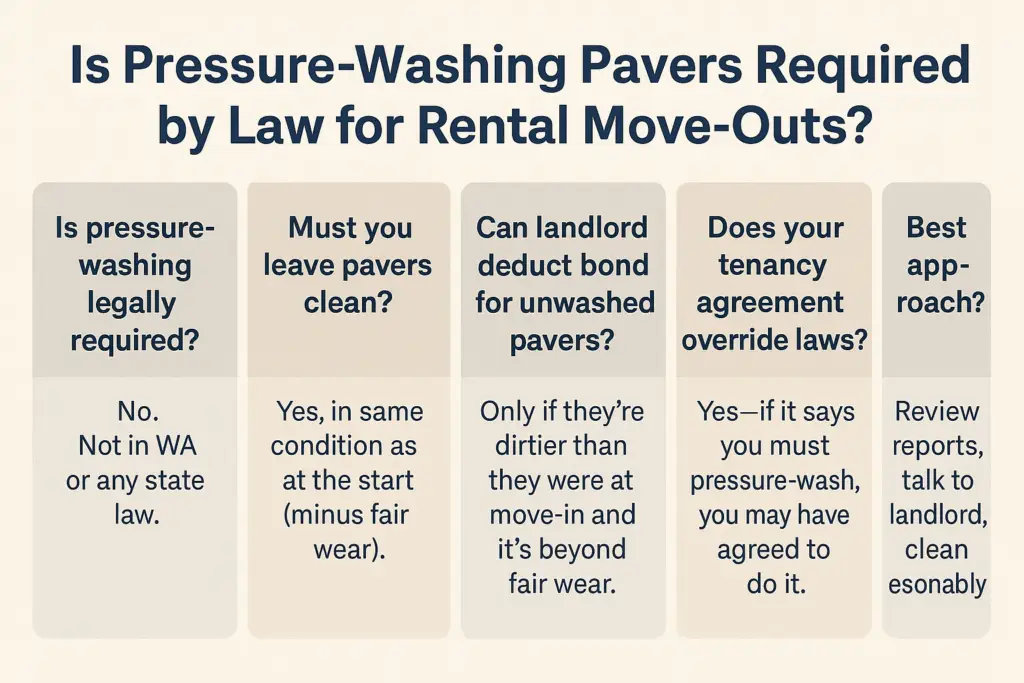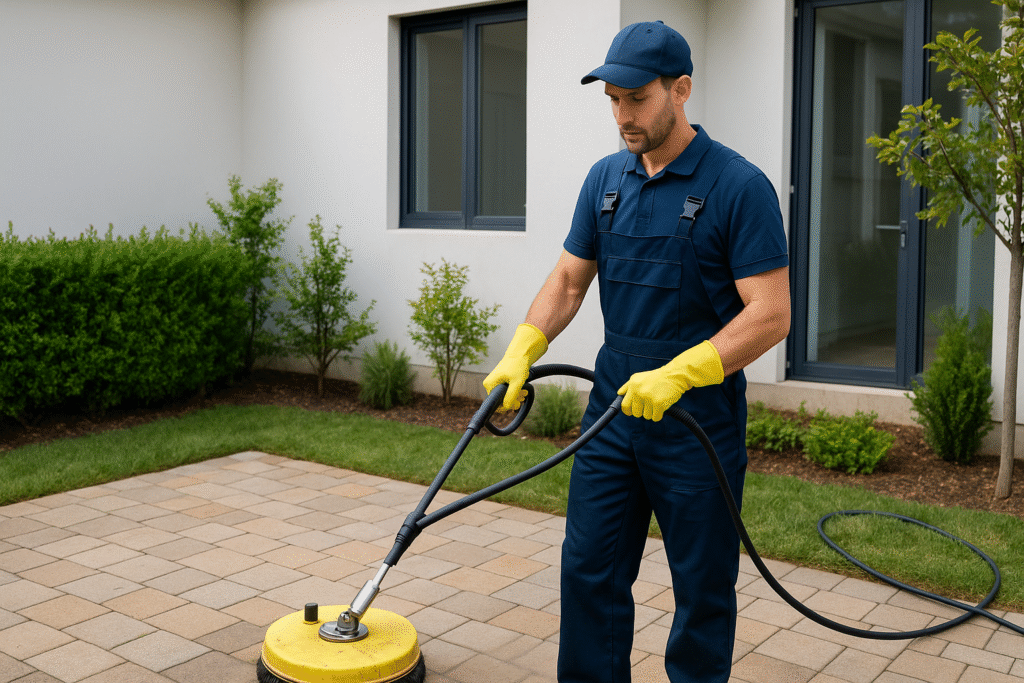Is Pressure Washing Driveways and Patios Required for Bond Cleaning in Perth?
Letting go of your rental can be quite a hassle. You’re sorting through a ton of boxes, managing your new space, and thinking about that paved patio or driveway. Is there a legal requirement to pressure-clean the pavers before leaving?Will your property manager forfeit your bond amount if you don’t?
As one of Perth’s most trusted end of lease cleaning specialists, we’ve assisted countless tenants with these vacate cleaning puzzles. It’s important to know what your responsibilities are and which areas you need to address to avoid unnecessary cleaning expenses and achieve a smooth move-out. Let us explain it in the simplest terms.
What is the Law Regarding Cleaning When You Move Out?
In Australia, the rules relating to rental cleaning and end of lease requirements are governed under the Residential Tenancies Act of your state. Here’s what’s relevant to your vacate cleaning duties:
- Landlords are responsible for the security of the property and must maintain and repair items that break from normal usage
- Tenants must return the property in a reasonably clean condition, ensuring it’s returned clean minus normal wear and tear
Learning about legal obligations related to vacate cleaning in Perth is crucial to complete your move-out plan. The simple rule for end of lease cleaning is: Return the property to the same level of cleanliness as when you moved in.
What About Pressure Washing Pavers?
Here’s what’s crucial for your vacate cleaning checklist:
- Pavers are outdoor areas and are part of the garden maintenance for the property during the tenancy
- Basic garden maintenance like light weeding, mowing, and tidying is typically done by the tenant
- Large repairs are the responsibility of the landlord (including repairing broken paving), unless the tenant caused the damage
The most important point for end of lease cleaning is this: The law does NOT require you to pressure wash outdoor paving. No tenancy legislation in Australia imposes this as a standard vacate cleaning requirement.
The main guideline for Western Australia and other states is fairly straightforward: maintain the location based on your entry report, accounting for normal aging. External paving does not need to be pressure-washed as part of your move out cleaning duties. For a more comprehensive overview of Australia’s cleaning requirements, you can visit our state-by-state guide on professional end of lease cleaning requirements.
Could Your Landlord Still Expect It?
Even though it doesn’t apply to standard vacate cleaning laws, some landlords and property managers may expect pressure washing if:
- The paved area was pristine and documented during your move-in inspection
- Your lease agreement stipulates you agreed to pressure wash prior to vacating
- The landlord claims it’s necessary to return the property to the same condition
In this instance, they may argue it’s part of “reasonable cleanliness” and some bond money may be withheld if this condition isn’t satisfied. Understanding what cleaning standards actually matter for your bond return can help you avoid unnecessary costs during your move out.
How to Verify What Needs to Be Done
Follow these guidelines to help you make the determination:
1. Check Your Lease Agreement Carefully
Review your agreement for any mention of cleaning outdoor spaces or specific tasks like pressure-washing.
2. Review Your Entry Condition Report
This report shows how the paved area looked when you moved in. If the area was already dirty, stained, or had moss on it, you shouldn’t be required to make it spotless.
3. Speak with Your Landlord or Property Manager
Ask directly: “Are you expecting pressure-washing—or is a good sweep and scrub enough?”
4. Understand Fair Wear and Tear
Outdoor spaces naturally get dirty with weather over time. If the pavers were naturally weathered, that’s normal wear and tear—not your obligation to restore.
If They Do Request Pressure Washing
If your landlord says “Yes, please pressure-wash,” you can:
- Do it yourself by renting a pressure-washer (make sure it’s safe to use)
- Hire a professional if you’re busy and short on time
- Negotiate: Suggest using a stiff broom and hose instead, especially if the paving wasn’t perfect to begin with
Being reasonable and having a conversation often prevents bond disputes later. Many tenants are realizing that investing in professional bond cleaning services is more economical than the potential bond deductions and stress that comes with attempting to do everything themselves.
Bond Deductions: How They Work
According to WA tenancy rules:
- Landlords may deduct from your bond for cleaning beyond reasonable standards or for damage you caused
- They cannot deduct money for normal wear and tear or cleaning that wasn’t your responsibility
If paving looks dirty but it’s simply the result of natural weathering over time, that’s normal wear—not something they can charge you for. Understanding what you’re legally required to clean or repair when moving out helps you avoid unfair bond deductions.
How to Keep Your Bond Safe
Here’s how to protect yourself:
- Check your entry report: If the paving was already dirty, you don’t need to make it look new
- Clean what you can: Sweeping, weed removal, and hosing down is usually sufficient
- Take photos after cleaning and before returning keys
- Keep receipts if you hire help
- Get confirmation in writing if your landlord asks for more than basic cleaning
- Know the rules: You only need to return it as clean as you found it
Remember that outdoor cleaning is just one part of your move-out process. Don’t forget about indoor areas—carpet steam cleaning is often mandatory in Perth rentals and can significantly impact your bond return if not done properly. Taking a comprehensive approach to your end of lease cleaning ensures nothing is overlooked.

Why This Matters
Many bond disputes happen because of cleaning disagreements. Most could be avoided by understanding what’s actually required. Outdoor pavers naturally weather over time, so unless there’s clear damage or neglect, landlords cannot expect them to look brand new.
This is particularly important when dealing with Perth’s unique climate challenges. Learning how to safely clean cement and concrete grime from outdoor surfaces helps you address stubborn stains without risking damage to the property during your vacate cleaning process.
The Bottom Line
You’re responsible for basic outdoor tidying as part of your vacate cleaning duties—sweeping, weeding, hosing, and general cleaning. However, unless your lease specifically states “pressure-wash pavers” or your entry report showed them spotless, there is no legal requirement forcing you to pressure-wash paving as part of your end of lease cleaning obligations.
Think of pressure-washing as a potentially requested extra task, not a mandatory vacate cleaning requirement. Communicate clearly, check your documents, and keep evidence of whatever cleaning you do during your move out process.
Quick Moving-Out Checklist
- Check entry condition report
- Sweep and weed paved areas as part of vacate cleaning
- Hose down paving (pressure-wash only if requested/agreed)
- Take photos after cleaning
- Keep receipts if you hire help
- Get any extra end of lease cleaning requests from landlord in writing
Final Answer
Pressure-washing external pavers is not legally required by tenancy law in WA or other Australian states for standard vacate cleaning. You only need to leave them in the same condition they were in (minus normal wear and tear) as part of your end of lease cleaning obligations. Only if your lease specifically states pressure-washing or you agree to it, can it be required.
The key is being reasonable, communicating clearly, and documenting everything during your vacate cleaning process. This way, you’ll leave on good terms and get your bond back—without needing to rent expensive equipment unless truly necessary for your end of tenancy cleaning requirements.

